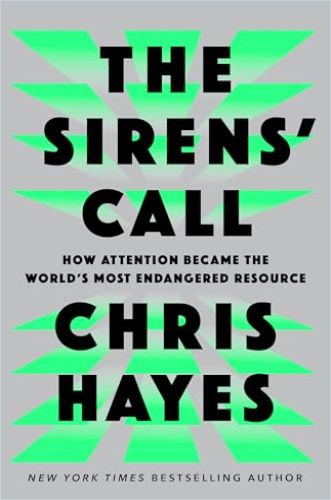News host Chris Hayes details how the attention economy steals your focus, time, money, and connection with others.

Pay To Pay Attention
Chris Hayes, host of MSNBC’s All In with Chris Hayes, explains how technology, smartphones, and social media transform people’s inner lives and create tech addiction worldwide.
Attention
Paying attention takes different forms, and the subjects you pay attention to, moment by aware moment, come to make up your life experience.
People focus their consciousness or awareness, paying attention voluntarily and by choice. In the past, attention-grabbing interruptions or incidents – for example, a siren or a gunshot – were the exception. Today, interruptions are the norm.
Increasingly it feels as if our experience is something that we don’t fully agree to, and the ubiquity of that sensation represents a kind of rupture. Our dominion over our own minds has been punctured.Chris Hayes
Powerful corporations solicit and harness people’s attention via smartphones and social media platforms. They commodify attention and profit from it. Consumers won’t buy a product, read a magazine, cast a vote, or come to a party unless the product, publication, politician, or host has their attention.
That means, Hayes explains, that your attention is the most valuable resource in the world. Companies profit by taking control of it.
Individual attention is limited. In ways you often are not aware of, your brain filters incoming information to avoid becoming overwhelmed. You also deliberately give your voluntary attention to your chosen activities, such as working, reading, or watching a movie. An alarm clock or an unexpected explosion grab your involuntary attention. Social attention is the regard you give to someone else.
People have difficulty dealing with having an “unoccupied mind,” and – in parallel – possess a vast appetite for amusement and information. This constant need for distraction and diversion – even if they are empty and meaningless – is relentless. The more people seek diversion, especially on their phones, the more they feel restless, bored, and in need of more diversion.
Many smartphone users behave like drug addicts. They always need more juice to stave off desolate boredom. Modern technology and the online social life it spurs generate the boredom and disorientation that afflict many people.
We can only experience the existential satisfaction of recognition from those we truly recognize. We can only have our own personhood affirmed by other people we grasp deeply as persons themselves.Chris Hayes
People find complete solitude – such as solitary confinement in prison – unbearable. To obtain social attention, mostly from strangers, many seek fame or public regard in whatever venues they can penetrate. This kind of attention ultimately proves unsatisfying, particularly compared to attention from people you know.
Alienation
Smartphones and the internet shape today’s most typical form of alienation. With the commodification of attention, people feel that social forces have invaded their inner lives and stolen their attention. In Hayes’s analysis, that makes modern alienation part of a conflict between capitalism’s market economy dynamic and people’s sense of their own lives.
Given the relative scarcity of attention compared to the abundance of information, companies that profit from the attention economy constantly try to expand the attention they can commodify.
Many assumed that the advent of computers, the internet, and the information age would increase economic productivity. But it hasn’t. Between 1920 and 1970, productivity grew by about 2% in the United States. Between 1994 and 2004, American productivity was barely 1%, and in the following years, it fell to 0.4%. No matter how fast computers run and how much information is findable online, people are still doing the work, and their attention is finite. The information age is the attention age, and that places a natural, human limit on how much productivity can grow.
The famous mid-19th-century debates between Abraham Lincoln and Stephen Douglas were dense, tightly reasoned, literary, and long. People listened to them in person for hours. That was the era when the written and spoken word was the most significant form of communication. Today, whether you’re selling cereal or a political candidate, you must first grab people’s attention so you can try to persuade them to do as you want.
The obsessive need to capture attention engulfs anything resembling debate, dialogue, or persuasion. The attention age rewards people who seek attention at any cost. In this context, the people with the loudest, brashest voices get the most notice. In the United States, the current attention regime lacks centralized governance and doesn’t follow accepted rules of engagement. The rich, powerful, and famous muster public attention in order to impose their will.
Attention Economy
What you pay attention to – be it a spouse, kids, your career, a hobby, or politics – forms the core of your experience and meaning. Yet in the smartphone-driven attention age, people often feel they aren’t being fully attentive to the people, activities, and events that matter most to them. People may want to read long books on subjects they care about, cook gourmet meals, or focus on the needs of those they love. But instead, they waste hours doomscrolling through their social media feeds. Consider: If people’s attention wasn’t being commodified and sold, what else might they anoint as sufficiently important to deserve their focus?
There are a few ways forward, paths that are open to us and are not mutually exclusive, for how to restore our collective control over our own minds.Chris Hayes
Over time, Hayes says, you can expect the emergence of alternative attention markets that don’t involve commodifying your focus. Programmers could develop online spaces that don’t seek only to optimize revenues. In the earlier incarnation of the information age, the internet wasn’t always a commercial venture. As recently as the early 2000s, it was a venue in which you could pursue your interests, post information and ideas, create communities, and interact with other people — all without any person, company, or institution scanning your activities and making money off them. The current form of the attention economy is not the only form it can take, and it will almost certainly change. Alternate attention spaces are possible.
Your Attention
Chris Hayes reports on the way technology is devouring attention and, therefore, lives, and finds that many people don’t want their tech to swallow them. Instead, they’d like to exit the attention economy. In this potent analysis, Hayes suggests escape hatches and shares insights he’s gained as a national broadcaster. As you might expect from a national broadcaster, his insights are middlebrow and well-reported but not particularly imaginative. He cites issues of the attention economy in broad strokes and draws intriguing conclusions. He writes in straightforward terms that anyone can understand. Those who have not considered the social, political, and moral implications of the attention economy will learn valuable, foundational lessons from Hayes.














